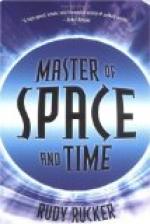At this time Bell enjoyed the friendship of Dr. Clarence J. Blake, an eminent Boston aurist, who suggested that the experiments be conducted with a human ear instead of with a mechanical apparatus in imitation of the ear. Bell eagerly accepted the idea, and Doctor Blake provided him with an ear and connecting organs cut from a dead man’s head. Bell soon had the ghastly specimen set up in his workshop. He moistened the drum with glycerine and water and, substituting a stylus of hay for the stapes bone, he obtained a wonderful series of curves which showed the vibrations of the human voice as recorded by the ear. One can scarce imagine a stranger picture than Bell must have presented in the conduct of those experiments. We can almost see him with his face the paler in contrast with his black hair and flashing black eyes as he shouted and whispered by turns into the ghastly ear. Surely he must have looked the madman, and it is perhaps fortunate that he was not observed by impressionable members of the public else they would have been convinced that the witches had again visited old Salem town to ply their magic anew. But it was a new and very real and practical sort of magic which was being worked there.
His experiments with the dead man’s ear brought to Bell at least one important idea. He noted that, though the ear-drum was thin and light, it was capable of sending vibrations through the heavy bones that lay back of it. And so he thought of using iron disks or membranes to serve the purpose of the drum in the ear and arrange them so that they would vibrate an iron rod. He thought of connecting two such instruments with an electrified wire, one of which would receive the sound-vibrations and the other of which would reproduce them after they had been transmitted along the wire. At last the experimenter was on the right track, with a conception of a practicable method of transmitting sound. He now possessed a theoretical knowledge of what the telephone he sought should be, but there yet remained before him the enormous task of devising and constructing the apparatus which would carry out the idea, and find the best way of utilizing the electrical current for this work.
Bell was now at a critical point in his career and was confronted by the same difficulty which assails so many inventors. In his constant efforts to achieve a telephone he had entirely neglected his school of vocal physiology, which was now abandoned. Georgie Sanders and Mabel Hubbard were his only pupils. Though Sanders and Hubbard were genuinely interested in Bell and his work, they felt that he was impractical, and were especially convinced that his experiments with the ear and its imitations were entirely useless. They believed that the electrical telegraph alone presented possibilities, and they told Bell that unless he would devote himself entirely to the improvement of this instrument and cease wasting time and money over ear toys that had no commercial value they would no longer give him financial support. Hubbard went even further, and insisted that if Bell did not abandon his foolish notions he could not marry his daughter.




